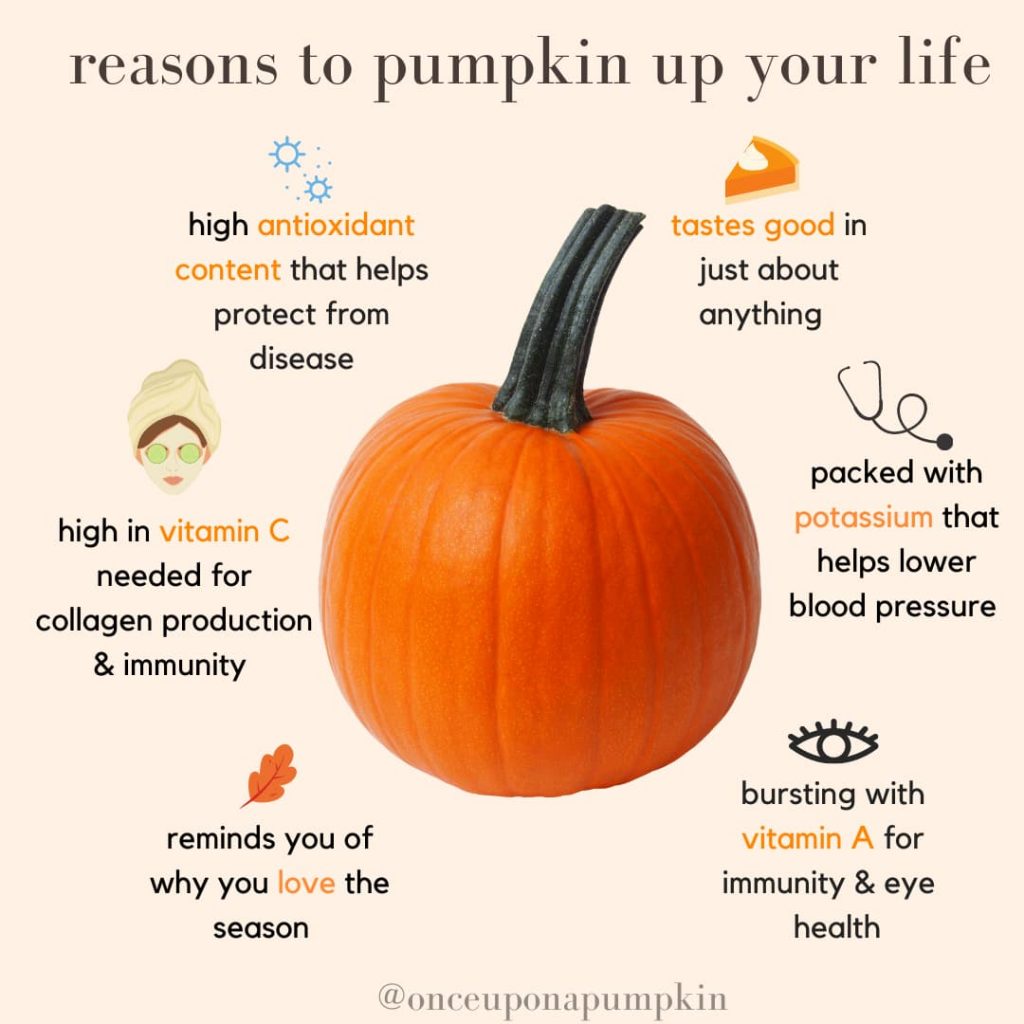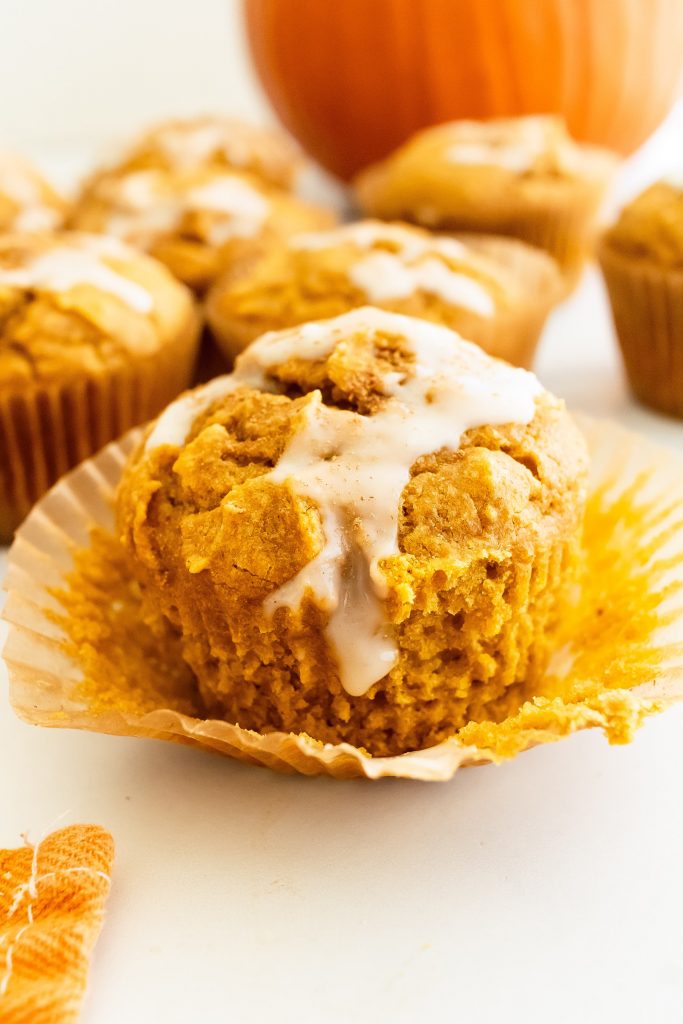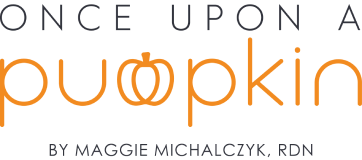Learn more about the health benefits and nutrition of pumpkin, and why it truly is a fall superfood. Packed with vitamins, minerals and antioxidants, there’s many reasons to incorporate it into meals and snacks year round and especially in the fall!
Health Benefits of Pumpkin
Yes, we love the taste in our lattes, muffins, cookies and pies, but did you know that pumpkin is also bursting with lots of great nutrition too?! This fall superfood is packed with vitamin A, C, and E as well as potassium fiber, copper and manganese. Part of the squash family, it’s also very high in antioxidants which help protect our bodies from disease causing free radicals and inflammation.
Coming in at less than 50 calories per cup, it’s nutrient dense and made up of nearly 95% water. Even the color orange screams nutrition (you’ll have to keep reading to find out why!).
Anything you add pumpkin to becomes more nutritious, flavorful and fluffy too! That’s the cool thing about pumpkin is that not only is it versatile, and nutritious, it also provides a moist and fluffy, or creamy texture to baked goods, soups and more. You can even use pumpkin as a egg, oil, and butter replacer in baked goods!
If you’re not already convinced that pumpkin should be a year round food, keep reading for more information on health benefits of pumpkin! I am truly in awe of how nutritious pumpkin is!

Nutritional Value of Pumpkin
According to the USDA Food Data Central, one cup of cooked pumpkin contains:
Calories: 49
Fat: 0.2 grams
Protein: 2 grams
Carbs: 12 grams
Fiber: 3 grams
Vitamin A: 245% of the Reference Daily Intake (RDI)
Vitamin C: 19% of the RDI
Potassium: 16% of the RDI
Copper: 11% of the RDI
Manganese: 11% of the RDI
Vitamin B2: 11% of the RDI
Vitamin E: 10% of the RDI
Iron: 8% of the RDI
Pumpkin puree also contains small amounts of magnesium, phosphorus, zinc, folate and several B vitamins.
And don’t forget the seeds are edible and nutritious too! Pumpkin seeds are small but mighty when it comes to nutrition. They’re packed with magnesium, plant-based protein just to name a few!
Pumpkin Fiber
One cup of pumpkin contains around 3 grams of fiber. Dietary fiber or “roughage” is the part of plant food that cannot be digested by our bodies. We need it for our digestive systems to work properly, it keeps us regular and gives our meals more staying power, aka satiety.
Unfortunately, most of us don’t get enough fiber on a daily basis, but that’s where pumpkin can help. Adding pumpkin to things like oatmeal, soups, smoothies and baked goods is an easy way to get more fiber in your diet the fall and year round (you can find canned pumpkin at most grocery stores year round, so there’s no excuse not to buy it!).
Pumpkin Vitamins
Pumpkin contains essential vitamins and minerals that are needed for our health and proper nutrition status. Even the fact that pumpkins are orange gives us a clue into just how nutritious pumpkins really are.
Vitamins in Pumpkin
- Vitamin A. The fact that pumpkins are orange tells us that they’re packed with the antioxidant beta carotene. Beta carotene is a plant carotenoid that gets converted into vitamin A in the body and in the process performs key functions that are important for overall health. Vitamin A is crucial for our immune system,, helps protect the eyes from night blindness and age related decline, important for the reproductive system and may lower the risk of certain types of cancers.
- Vitamin C. Vitamin C is a powerful antioxidant that is needed for proper immune function, tissue repair and collagen production in the body. It also helps your body absorb and store iron.Vitamin C is a water soluble vitamin, which means the body doesn’t store it and we need to consume it through the foods we eat daily.
- Vitamin E. Vitamin E plays a role in vision, reproduction, and blood, brain and skin health. It is an antioxidant meaning it helps to combat free radicals damage from the environment and may be beneficial at reducing UV damage to skin.The recommended daily amount of vitamin E for adults is 15 milligrams a day.
- Vitamin B2. Vitamin B2, also known as riboflavin is crucial for breaking down food components, absorbing other nutrients, and maintaining tissues. Avoiding B vitamin deficiency is important because B vitamins help the body convert food into energy (metabolism), create new blood cells, and maintain healthy skin cells, brain cells, and other body tissues.
Minerals in Pumpkin
- Potassium. Potassium is one of the most important minerals and electrolytes in the body. It helps regulate fluid balance, muscle contractions and nerve signals. A high-potassium diet may help reduce blood pressure and water retention, protect against stroke and prevent osteoporosis and kidney stones. Pumpkin contains 16% of the recommend daily intake (RDI) of potassium
- Iron. Iron is a crucial mineral for blood production in the body and is found in our red blood cells. It is needed for transferring oxygen in your blood from the lungs to the tissues. Women are especially at risk for iron deficiency, so getting it from different food sources is important. Since pumpkin is a plant source of iron (aka non-heme iron) it is better absorbed by the body when consumed along with a source of vitamin C.
- Copper. In conjunction with iron, copper enables the body to form red blood cells. It helps maintain healthy bones, blood vessels, nerves, and immune function, and contributes to iron absorption.
- Manganese. Manganese is a trace mineral (meaning we only need it in small amounts) that helps activate many enzymes in metabolism and plays a role in a variety of chemical processes in the body. It helps with protein and amino acid digestion, and the metabolism of cholesterol and carbohydrates.
Pumpkin for Constipation
Is pumpkin good for constipation?! Since it’s a good source of fiber, adding pumpkin to your diet in a variety of ways can help maintain regularity and proper digestive system function. Pumpkin seeds are also a good source of fiber, and easy to incorporate into the diet. I love adding a handful to salads for a nice crunch!
This is also why your vet tells you to give your dog pumpkin when they’re having tummy troubles. Pumpkin is great for dogs and can help when they are constipated or have diarrhea.
Is canned pumpkin just as nutritious?
Yes, absolutely! Just because it’s in a can does not mean it’s less nutritious than fresh pumpkin. In fact, I know that in some cases pumpkins are harvested and canned within an hour! You can feel good knowing you’re getting all of the health benefits from pumpkin in a can of pumpkin too.
Pumpkin Benefits for Skin
Have you ever noticed that pumpkin is in some skincare products?! That’s not by mistake or because they they think people just like pumpkin in everything, it’s because pumpkin contains that trifecta of vitamin A, C, and E, which are all beneficial for skin health.
Vitamin C is a precursor for collagen, helping the skin maintain elasticity and hydration and along with Vitamin E help protect the skin from free radical damage thanks to their antioxidant properties. Beta-carotene (what makes pumpkins orange) is another powerful antioxidant that helps maintain skin health and appearance.
Beta carotene then gets converted into vitamin A, which contains retinoids, that help improve skin tone, reduce UV damage and minimize fine lines and wrinkles. Add skin savior to the list of the health benefits of pumpkin! So not only is the nutrition found in pumpkin beneficial for your overall health, it’s also great for your skin too!
Check out this post for some of my favorite pumpkin home decor and beauty products that contain pumpkin!

Hungry for more pumpkin?!
Be sure to check out a couple of my favorite pumpkin recipes to reap the health and nutrition benefits of pumpkin as well as my new pumpkin cookbook!
Healthy Pumpkin Recipes
- better than starbucks pumpkin bread {DF}
- pumpkin chickpea blondies {GF &DF}
- pumpkin apple baked oatmeal {GF & DF}
- vegan pumpkin chocolate chip cookies {V}
- healthy pumpkin muffins with spiced maple glaze {DF}
Pumpkin Cookbook
Love everything and anything pumpkin like I do?! Keep up with all things pumpkin this fall with me on Instagram and be sure to check out my new pumpkin cookbook, The Great Big Pumpkin Cookbook available now on Amazon and Target.com with over 50 pumpkin recipes, including gluten free, dairy free, and paleo friendly recipes!


Sounds yummy, something to look forward to. Am planning to try a few of these pumpkin recipes.
(Shame that so many of these wonderfully nutritious foods get put on front porches just for a day or two around Halloween! Like beautiful Christmas trees cut down and discarded after their decorative use is over.)